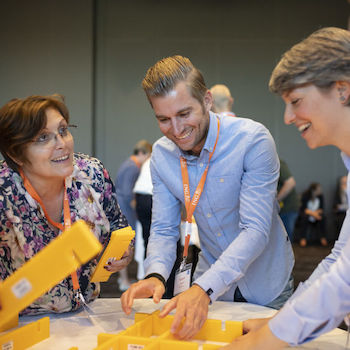
Top-quality Executive MBAs share many characteristics. Most offer general management training, study trips, career coaching, and electives that deepen specialized knowledge. In these ways, European EMBA programs are much like their U.S. counterparts.
For most, the aim is “to turn managers into leaders,” as one school put it to us. Typically, the EMBA is for people who want to step up a level in their career — to move into the C-suite or onto the board. The EMBA also appeals to people who want to make a change of direction, by setting up their own business or leading new projects in their own company, so entrepreneurship skills are a big component these days. The average age of EMBA students tends to be around 40, though participants can range from the late 20s to the mid-50s. (The younger students tend to be tech startup managers who have gained seniority quickly.)
EMBAs are part-time courses for managers who carry on doing their day jobs while studying. Because of this, people tend to take EMBAs close to where they are based. While EMBAs can look very international in terms of the passports participants hold, bear in mind that in big cities, many of those international students work locally.
For those in the U.S. and Asia who are thinking of studying far from home, Europe offers a huge variety of EMBAs. Here’s our list of the five most interesting right now.
ESADE – Madrid and Barcelona
The highly regarded Global EMBA that ESADE ran along with the McDonough School of Business at Georgetown University is on hold at the moment, but you can still get the ESADE EMBA experience. For English-speakers, the best option is the monthly program, with three days of classes each month alternating between Madrid and Barcelona.
As home to an incubator, ESADE has a strong innovation and technology flavor, which is why its EMBA attracts tech whizzes. This accounts for the young average age of 35. They often have an age spread of 29-45, though this year their youngest student is an astonishing 27. Also unusual: the proportion of women on the EMBA. Most schools are happy to hit 30%, but at ESADE it is regularly over 40% and has been known to top 50%. Only about 20% of participants are Spanish — because home-grown managers tend to enter one of the several English/Spanish versions of the program.
ESADE stresses its internationalism, and half of EMBA candidates complete the final three-month elective portion of the course in a partner school outside of Spain. ESADE is owned by a foundation and has definite ethical DNA, stressing “cooperative leadership” — the idea that collaboration is more important than competition in business.
“We always say that we don’t aim to produce the best manager in the world, but the best managers for the world,” says Michele Quintano, director of ESADE’s open enrollment programs.
Fast stats:
- Cohort size: 147
- Nationalities: 31
- Course length: 16 months
- Cost: €64,000
ESMT – Berlin
 Although most still have a corporate background, 70% to 80% of EMBA applicants to ESMT are now not sponsored by an employer. This is reflected in an eclectic cohort that may include scientists starting their own business, family business inheritors, or heads of nonprofits.
Although most still have a corporate background, 70% to 80% of EMBA applicants to ESMT are now not sponsored by an employer. This is reflected in an eclectic cohort that may include scientists starting their own business, family business inheritors, or heads of nonprofits.
Perhaps unsurprisingly, as it is in one of Europe’s hottest startup cities, Berlin’s top B-school school has recently started receiving more applications from new business owners in tech. A third of students on this EMBA are German, and a further 40% hail from other European countries.
Recent program additions include a new module on Evidence-Based Management, which exposes students to cutting-edge research tailored to their own business issues; and individual executive coaching, which complements the school’s already robust team-based coaching. ESMT says a strong thread of sustainability, ethics, responsible choices, diversity, and personal resilience in a changing world also run through the program.
Students can have one-to-one “fireside chats” with business leaders. They are also taught coaching as a management tool. “We help our students imagine and evaluate a variety of options, experiment with new possible career trajectories, and understand the costs of the choices they consider,” says Konstantin Korotov, faculty lead of the Executive MBA program at ESMT.
Fast stats:
- Cohort size: 54
- Nationalities: 24
- Course length: 18 months
- Cost: €57,500
ESMT Berlin Executive Education
HEC Paris
Flexibility is key to the HEC Paris EMBA, and students can choose from five different schedules ranging from one day a week for a year, to nine- or six-day modules every two months.
The course takes 52 to 54 days, plus 10 days for the specialization, and lasts 15-18 months, depending on how students do it. Participants can also take up the “international mobility” option and take the course in Paris, Qatar, and China. In fact, 45% of students follow this approach.
The second part of the course is split into eight “majors” or “specializations,” such as Aerospace & Aviation, or Luxury. Two specializations are focused on startups: Entrepreneurship & Innovation and Entrepreneurship – Project Accelerator, reflecting one of HEC’s big focuses. It is involved in Europe’s biggest accelerator, Station F in Paris (which we wrote about here); last year, 35% of HEC EMBA graduates set up their own business upon graduation.
Who is HEC Paris looking for? People who want to make a profound change. “It’s about transforming people’s lives,” says Christine Baldy, director of Executive MBA programs. “At the start, we tell the new intake that this is the first day of the rest of their life.”
Fast stats:
- Cohort size: 220
- Nationalities: 50
- Course length: 20 months
- Cost: €79,950
London Business School – London, Dubai
 The LBS EMBA can be taken at either the campus near Regents Park in London, or in Dubai. The course and faculty are identical, and the only difference is the program structure. In London it’s delivered every other Friday and Saturday; in Dubai, for four or five days a month, in a single Wednesday-to-Saturday chunk.
The LBS EMBA can be taken at either the campus near Regents Park in London, or in Dubai. The course and faculty are identical, and the only difference is the program structure. In London it’s delivered every other Friday and Saturday; in Dubai, for four or five days a month, in a single Wednesday-to-Saturday chunk.
Although international, with over 25 nationalities, around 40% of students are from the home region — the UK in the case of London, the Middle East and Africa for Dubai — giving these programs a local flavor. The horizon-broadening continues during the program’s global business assignment, a week-long faculty-led course in which students network and learn how business is done in one of six global business hubs.
Personalization is a big aim, with the last seven months of the 20-month program devoted to electives; students can take six to eight out of 70 choices. In future, LBS plans to add more experiential learning, especially with a focus on CSR and social impact in cities such as Athens, Greece; Mexico City, Mexico; Beijing, China; Buenos Aires, Argentina; and Silicon Valley. They’re also deepening the leadership and executive coaching content “to create an international, personalized, challenging and ultimately highly fulfilling learning experience for each student,” says Arnold Longboy, executive director of Leadership Programs at LBS.
Fast stats:
- Cohort size: London: average 80; Dubai: average 55
- Nationalities: London: 28; Dubai, 26
- Course length: 20 months
- Cost: London: £90,80; Dubai: $124,900
London Business School Executive Education
Saïd – Oxford
Every Saïd EMBA candidate is also a member of an Oxford College, meaning that they get to participate in broader university life. The program itself is very much embedded in this global university. “We see ourselves as part of a community that is full of people asking questions about big problems, and seeking solutions to those problems,” says Kathy Harvey, associate dean for the MBA and executive degree programs.
The program has three broad themes: Entrepreneurial Thinking; Strategic Leadership; and Global Complexity and Risk. It involves study trips to China to see an emerging economy in action, and to Silicon Valley to gain insights into startup culture. A project focuses on a big theme: the future of energy, or water, for instance. A quarter of the cohort is from the UK, and a third is continental European.
All core courses are taught by Saïd faculty, but they do draw in people from the wider university at times; for example, a Shakespeare expert lectures on leadership, and the director of the university’s Ashmolean Museum lectures about trade routes and the development of money.
The program takes place over 16 monthly, week-long sessions. Who is it for? As a former student put it: “People who want to change the world but need a bit of help.”
Fast stats:
- Cohort size: 69
- Nationalities: 36
- Course length: 21 months
- Cost: £87,000
DON’T MISS: STANFORD VAULTS TO NO. 1 IN FT 2019 EXEC ED RANKING or WHAT TOP SCHOOLS ARE NOW CHARGING FOR THEIR EXECUTIVE MBA PROGRAMS





Questions about this article? Email us or leave a comment below.